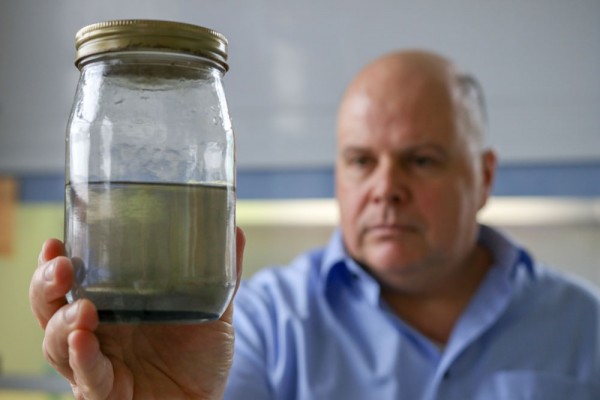 UWindsor's Joel Gagnon, associate professor and department head of Earth and Environmental Sciences, examines a sample of well water taken from a residence in Chatham-Kent.
UWindsor's Joel Gagnon, associate professor and department head of Earth and Environmental Sciences, examines a sample of well water taken from a residence in Chatham-Kent.
A teaching opportunity that mirrors the conditions and pressures of the real world doesn’t come along every day.
So when the University of Windsor’s Joel Gagnon was approached to analyze well water at the centre of a contentious debate in Chatham-Kent, he knew he had to get involved.
“This is the exact opportunity we want for students in our field school,” said Dr. Gagnon, department head in Earth and Environmental Sciences. “It gives us real word problems where they can create data that may have real value to decision makers.”
The issue has been affecting residents in Chatham-Kent for the last two years but was thrust into the spotlight last week when Essex MPP Taras Natyshak was ejected from the legislature for demanding the acting minister of environment and climate change drink a sample of well water at Queen’s Park.
Gagnon was first made aware of the issue a year ago after a UWindsor alumnus, who works as a well driller, approached him to probe the issue.
“We are a university, so we create information, we create data, and we create knowledge that may be of use to others,” Gagnon said.
“There’s an interesting scientific question here because it appears the water quality may have changed but it’s challenging to say because it was never a great aquifer in terms of yields.
“But some of the wells are producing a considerable amount of sediment and the general opinion is that it hasn’t happened in the past.”

Dr. Gagnon is bringing a team of earth and environmental science students to examine several water wells in Chatham-Kent.
Gagnon said it’s still too early to offer any insight into the contaminated well water.
“First of all, there’s some uncertainty about what the material is so we are going to go back and collect more samples,” he said. “It is shale particles? Biological material? Or is it simply organic carbon from the bedrock? Then we will look to see if the material is the same everywhere or if it varies from place to place.”
Water Wells First, a grassroots citizen group that first sounded the alarm on the impacted well water, has pointed to pile driving in the construction of wind towers for North Kent Wind as a possible cause.
“We are not consultants and we’re not here to take a side,” Gagnon said. “That’s not our role. We are here to train students and do good science.”
He said he does hope their research will help contribute to a solution for the affected residents.
“If you have ever lived on a farm or had your well go down, even for natural causes, it can be terrible,” Gagnon said.
“I don’t think many people appreciate the impact an issue like this can have on someone’s life.”
Dylan Kristy
